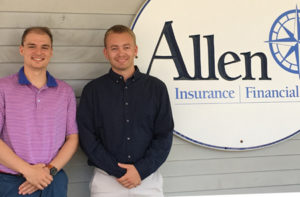

Maine Workers Compensation Board Defines ‘Independent Contractor’
There are some new rules in Maine around Workers Compensation Insurance and Independent Contractors. The Maine Workers Compensation Board has issued a newsletter with some important information.
Independent contractors are workers who perform services for remuneration under a verbal or written contract, but who are not under the essential control or superintendence of another person, both under the person’s contract of service and in fact. The worker must also meet specific criteria.
In order for a person to be an independent contractor they must meet the test in §102(13-A) of the Workers’ Compensation Act. An independent contractor is not required to have workers’ compensation insurance; however an independent contractor is required to have workers’ compensation insurance for any employees hired by the independent contractor.
Newsletter from Maine Workers Compensation Board – June 2019
Meet Our Summer Interns

From left: Jack Gallagher and Daulton Wickenden
Allen Insurance and Financial is hosting two summer interns in 2019. Both are graduates of Camden Hills Regional High School and attend colleges in Maine.
Jack Gallagher of Camden is a graduate of Thomas College in Waterville and will be working in both the insurance and financial divisions at Allen Insurance and Financial before returning to Thomas this fall to study for his MBA.
Daulton Wickenden of Rockport, who will be a fall 2019 graduate of Husson University, is focused more exclusively in the company’s personal insurance division.
“These internships will provide a complete immersion into the nature of our work at Allen Insurance and Financial,” said company president Mike Pierce. “Jack and Daulton will have the opportunity to put their academic experience to work to complete a variety of business assignments. We look forward to working with them this summer.”
Allen Financial Featured Speakers at Maine Land Trust Network Conference


Abraham Dugal
Allen Financial advisors and wealth managers Abraham Dugal and Sarah Ruef-Lindquist, JD, CTFA, were speakers for a session at the Maine Land Trust Network’s day-long Land Conservation Conference held earlier this spring in Topsham at the Middle School.
Dugal and Ruef-Lindquist spoke about issues surrounding how to grow endowments through planned giving, when donors seek to provide long-term support through gifts that can be more complex than cash or marketable securities.
Land trust staff and board members gather annually for the opportunity to network, share organizational best-practices and learn from experts in fields that include conservation, land preservation, marketing and finance. It is produced by the Maine Coast Heritage Trust.



Sarah Ruef-Lindquist, JD, CTFA
Dugal and Ruef-Lindquist spoke about the policy foundations and recognition practices they view as necessary to have fiscally-sound and successful planned giving programs. Their backgrounds – hers as an attorney, financial and philanthropic advisor, trust officer; his as an investment manager and both as board members – contribute to their unique perspectives as advisors and fiduciaries and how they approach potential gifts through clients’ estate and financial planning.
Given the unprecedented intergenerational transfer of wealth taking place in the United States, and the projections for gifts to non-profit organizations during the next 30 to 40 years in the trillions of dollars, organizations are well-served to pay greater attention to this area of resource development to build their long-term financial sustainability.
Ruef-Lindquist Featured Speaker at Mount Desert Island Nonprofit Alliance



Sarah Ruef-Lindquist, JD, CTFA
Allen Financial advisor and wealth manager Sarah Ruef-Lindquist, JD, CTFA, was the featured speaker at the June monthly meeting of the Mount Desert Island Nonprofit Alliance at the Garland Farm. MDINA members work collaboratively to address operational issues and coordinate event schedules for the many Mount Desert Island non-profit organizations.
Participant groups who were represented at the meeting included the Schoodic Institute, Friends of Acadia, Seal Cove Auto Museum, MDI Hospital, Abbe Museum and Jessup Memorial Library.
After a brief tour and background presentation from Garland Farm personnel, Ruef-Lindquist spoke about the policy foundations, recognition practices and outreach necessary to have fiscally-sound and successful planned giving programs and endowment funds. Members submitted questions in advance of the meeting ranging from how to begin a planned giving program to how to begin a conversation with a donor about planned giving.
Given the unprecedented intergenerational transfer of wealth taking place in the United States, and the projections for gifts to non-profit organizations during the next 30 to 40 years in the trillions of dollars, organizations would be well-served to pay greater attention to this area of resource development to build their long-term financial sustainability, Ruef-Lindquist said. It is an area in which she has worked as a consultant, philanthropic advisor or trust officer for more than 20 years.
Anthem Recognizes Anna Moorman for 2018 Sales


Anna Moorman
Anna Moorman of Allen Insurance and Financial has received the Silver Award for Medicare Sales for her work with Anthem in 2018. Moorman placed eighth out of 181 brokers for top sales and seventh for Medicare Supplement Sales in the State of Maine.
Moorman has been with Allen Insurance and Financial for more than six years and is one of two agents at the company who specialize in the complex market of Medicare insurance. She works with a number of insurance carriers to give customers a range of choices to suit their needs.
The Anthem award was announced in Portland on May 1. This is the fourth consecutive year that Moorman has received an award from Anthem for Medicare sales.
“Our goal is to provide dedicated, one-on-one attention to our Medicare customers, assessing each person’s needs and finding options that will align with their budget and healthcare goals,” said Michael Pierce, company president. “I know Anna enjoys helping clients navigate the Medicare maze and as this award indicates her clients appreciate the way she simplifies the process.”
Welcoming Nikki Castellano


Nikki Castellano
Nikki Castellano has joined Allen Insurance and Financial as an assistant in the company’s benefits division.
A native of Pleasant Valley, N.Y. and graduate of Newbury College in Boston, Castellano’s work supports the Allen Insurance benefits division staff at their Chestnut Street location in Camden.
Castellano lives in Camden with her husband and their two sons. Outside of work, she is active in her community, currently serving as the marketing and fundraising coordinator for Megunticook Rowing, a Camden organization in which her sons are active. An interior designer in Boston, London and San Francisco for 12 years, Castellano is also a crafter/artist with a focus on use of recycled items.
Jane Harford Earns State Insurance License


Jane Harford
We are pleased to announce that Jane Harford has obtained a license to sell property and casualty insurance in the state of Maine.
Jane is a member of the support staff at the agency’s Camden office. A resident of Belfast, she joined the company in 2018.
The state-issued study guide for insurance licensing is 400+ pages. The state exams are comprised of 150 questions drawn from a pool of 2,400 questions on a complete range of subject areas, including business and personal insurance, workers’ compensation, maritime insurance and Maine insurance law.
As Financial Advisors, We are Not Afraid to Use the F-Word: “Fiduciary”
Several years ago there was a lot in the news about a fiduciary rule that was going to change how advisors worked; the imposition of a fiduciary standard of behavior meant that advisors would have to make decisions and recommendations for their clients in their clients’ best interests, and not their own.



Otherwise, advisors could charge commissions and earn fees on investments and other financial products that were perhaps questionably in their client’s best interests, but were definitely in the advisor’s best interests.
‘Fiduciary’ means essentially making decisions based on the best interests of someone beside yourself. While this isn’t a foreign concept to most people, it is not necessarily human nature. After all, survival instincts naturally tend toward self-preservation, not altruism. However, as advisors, we are in the unique position of helping others with decisions that require not only objectivity to understand available options, but professionalism and expertise to advise and recommend the best course of action for a particular individual’s circumstances.
Even though the fiduciary rule was not ultimately enacted as part of the regulatory scheme for financial advisors, some of us have always made it our practice to only make recommendations in our clients’ best interests. It is easier to do that when your income is not based on commissions from sales. Fee only planners are compensated solely by the client with neither the advisor nor any related party receiving compensation that is contingent on the purchase or sale of a financial product. Fees are usually paid through the investment management of one or more portfolios based on a percentage of their value, or in some cases for consulting work done on an hourly basis.
A question to ask yourself if you have a financial advisor would be are they acting in a fiduciary capacity for you?
Doing Well by Doing Good? The Increasing Practice of Socially Responsible Investing
There are many ways to be well. Most people consider wellness to include physical health and well-being. Some would also consider emotional, financial and spiritual wellness as worthy of their attention, and devote time and resources to addressing issues to promote those types of wellness.



For many investors, this approach aligns with their desire to support business that are “doing good” in the world either in terms of what social or environmental issues they are addressing, and perhaps in terms of how they govern themselves and treat the employees within their companies.
In recent years, greater emphasis has been placed on the intersection of financial wellness and emotional or spiritual wellness. The world of investing has begun to focus attention on ways in which capital can be invested to support businesses that are promoting social or environmental welfare, and/or govern themselves in a way that promotes diversity and inclusion of those historically marginalized in corporate leadership, either by virtue of gender, race or other suspect criteria.
What has come to be known as Socially Responsible Investing (SRI) or Environmental Social Governance investing (ESG) involves using criteria like environmental, social, governance and employment practices to choose what investments will be held in a portfolio. According to Commonwealth Financial Network’s website:
Sometimes referred to as environmental, social, and corporate governance (ESG) investing, Socially Responsible (SRI) is a broad-based strategy in which corporate responsibility and societal concerns are factored into investment decisions. In short, an SRI strategy seeks to maximize both financial return and social good.
Companies that deal in tobacco, gambling, fossil fuels, weapons, or involve child labor, employee discrimination, or lack board diversity are the kinds that get attention in SRI/ESG screening. Mutual funds will screen out companies that don’t measure up in those areas.
This has broad appeal for many investors, but for some time there have been concerns that one could sacrifice market performance for social benefit. For example, removing fossil fuel stock from a portfolio could exclude some of the top performing companies during certain market periods. That is a difficult choice to make. Over time, the index that measures the performance of mutual funds that screen for SRI companies has shown that the gap has narrowed significantly between the general mutual and exchange-traded fund world and SRI-screened funds.
According to a US News and World Reports June 7, 2018 blog post entitled Socially Responsible Investing Delivers:
Research and performance history imply that socially responsible investors receive superior absolute returns and risk-adjusted performance, while also addressing sustainability concerns. Dollars invested in sustainable and socially responsible strategies provide companies with better ESG metrics easier access to capital, which reduces the cost of equity and supports higher stock prices.
So when you’re thinking about your own wellness, consider whether a more socially responsible approach to investing makes sense for you. Would knowing that your investments were supporting companies working to improve the environment, or address social causes, or include women and minorities in executive leadership add value to your experience as an investor? As with all investment choices, you should consult with your financial advisors before making any changes to your portfolio or investment strategy.
Socially responsible investing involves the exclusion of certain securities for nonfinancial reasons. This may result in the investor forgoing some market opportunities that may have been available to those not subject to such criteria. There is no guarantee that any investment goal will be met.
- « Previous Page
- 1
- …
- 33
- 34
- 35
- 36
- 37
- …
- 89
- Next Page »

